|
|
|
Sort Order |
|
|
|
Items / Page
|
|
|
|
|
|
|
| Srl | Item |
| 1 |
ID:
103867
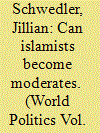

|
|
|
|
|
| Publication |
2011.
|
| Summary/Abstract |
Recent years have seen a surge of studies that examine the inclusion-moderation hypothesis with reference to political Islam: the idea that political groups and individuals may become more moderate as a result of their inclusion in pluralist political processes. Most of these interventions adopt one of three foci: (1) the behavioral moderation of groups; (2) the ideological moderation of groups; and (3) the ideological moderation of individuals. After a discussion of various definitions of moderate and radical, the concept of moderation, and the centrality of moderation to studies of democratization, the author examines the scholarship on political Islam that falls within each approach. She then examines several studies that raise questions about sequencing: how mechanisms linking inclusion and moderation are posited and how other approaches might better explain Islamist moderation. Finally, she offers a critical analysis of the behavior-ideology binary that animates many of these models and suggests some fruitful paths for future research.
|
|
|
|
|
|
|
|
|
|
|
|
|
|
|
|
| 2 |
ID:
154238
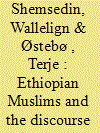

|
|
|
|
|
| Summary/Abstract |
This article provides insights into particular aspects of contemporary Islamic reformism in Ethiopia, focusing on what we have labelled the Intellectualist movement. Analysing the trajectory and the ideological underpinnings of the movement from the early 1990s to the present, the study interrogates the assertion that Ethiopian Islam has moved in a radical direction and argues that the Intellectualist movement has been a significant force moderating the domestic political-religious discourses. We demonstrate that it contributed to the production of political awareness among generations of young Ethiopian Muslims, which rather than contesting the existing political system, moved in a direction of a strengthened belief in secularism and democratic values. What is important here is that this took place in an increasingly constraining political environment, which, as often assumed, did not trigger any reaction of radicalization, but rather reinforced the adherence to a moderating discourse.
|
|
|
|
|
|
|
|
|
|
|
|
|
|
|
|
| 3 |
ID:
170971
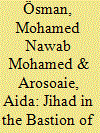

|
|
|
|
|
| Summary/Abstract |
Malaysia has long been hailed as a beacon of moderate Islam. Yet, at present, there is considerable support for ISIS amongst Malaysians, and it represents a unique articulation of contemporary violent Islamist extremism. Malaysians who joined ISIS in Syria and its supporters at home are characterized by a sense of Islamic righteousness. Also, they share distinctive features that differentiate them from the old jihadi generation: a diverse occupational background, the lack of either formal or informal religious training, and the growing nexus of criminality-radicalization. Malaysian support for ISIS can be historically and politically contextualized in relation to the Islamization race between the main political parties, the presence of Salafi-jihadi discourse and ISIS’s discursive construction of authentic Islam.
|
|
|
|
|
|
|
|
|
|
|
|
|
|
|
|
| 4 |
ID:
117093
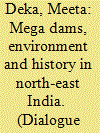

|
|
|
| 5 |
ID:
154896
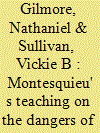

|
|
|
|
|
| Summary/Abstract |
Explicitly and implicitly in The Spirit of the Laws, Montesquieu binds together the Japanese who persecute Christians and the Inquisitors of Catholicism who persecute heretics. In seeking purity, both sets of vehement reformers impose atrocious punishments. In so binding the abuses of the East and West together, the work is an expression neither of Orientalism nor of Eurocentrism as conventionally understood. Although Montesquieu thus offers a critical approach to Europe's vulnerability to reformers who go to extremes, whether pious zealots who seek to perpetuate Christianity or zealous Enlightenment philosophes who would seek to eradicate it, many commentators have focused on the work's apparent neutrality with regard to the various cultural phenomena it examines. The key to understanding Montesquieu's reserved tone lies in his commitment to moderation. Given the West's continuing vulnerability to extremism of various types, Montesquieu's moderate teaching on the need for moderation in corrections remains pressingly relevant.
|
|
|
|
|
|
|
|
|
|
|
|
|
|
|
|
| 6 |
ID:
165549


|
|
|
|
|
| Summary/Abstract |
Members of the public are often left choosing between two extreme candidates who will not represent the moderate, aggregate, public effectively. Cross-pressured members of the U.S. Congress serve a constituency that votes for the opposite party at the national level. If there is any group of representatives that have an incentive to moderate their voting behavior, it is cross-pressured members. In this article, I show that cross-pressured members are more moderate than the average member of their party. This could provide constraints on rampant partisanship in the form of districts that are comfortable electing a representative of one party and voting for the president of the other. However, I show that these members are significantly less likely to be reelected. Thus a paradox exists in which cross-pressured members who moderate their voting behavior are no more likely to be rewarded for behaving the way citizens claim they want to represent.
|
|
|
|
|
|
|
|
|
|
|
|
|
|
|
|
| 7 |
ID:
117069
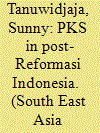

|
|
|
|
|
| Publication |
2012.
|
| Summary/Abstract |
This article focuses on the moderation strategy of the Prosperous Justice Party (Partai Keadilan Sejahtera, PKS) and its impact on the Indonesian party system. It makes the argument that PKS's moderation strategy is electorally challenging for both PKS and the Indonesian party system. PKS's moderation strategy has forced it into a difficult competition with established major parties for median voters. PKS's relative success is a product more of the poor performance of the existing Islamic parties than its moderation strategy. With PKS joining the catch-all party bandwagon, the Indonesian party system is now being shaped by dominant catch-all parties, and in the long run such a development will undermine the legitimacy of parties and will become detrimental to the process of democratic consolidation.
|
|
|
|
|
|
|
|
|
|
|
|
|
|
|
|
| 8 |
ID:
149446
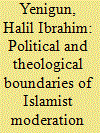

|
|
|
|
|
| Summary/Abstract |
This paper explores the repercussions of the apparent failure of Islamist experimentations with democracy during the Arab Spring in terms of the moderation hypotheses with a specific focus on the Egyptian case. I build on the existing arguments that repression may paradoxically moderate mainstream Islamist movements with certain caveats: when Islamists eventually come to power, their ideological vision also matters within the nexus of their strategic commitments and the on-going power struggles with other Islamist contenders. The prospects of democratisation, then, may also depend on the theoretical and political success of an Islamist political theology that accords better with rights and freedoms than a simplistic procedural democracy. Repression may indeed lead to moderation of the well-entrenched mainstream Islamist groups. However, such analyses focus only on those who remain within the fold of the mother organisation, rather than the splinter groups that break away with their more radicalised views. Under the post-Arab Spring conditions and given the Salafi factor, current views on the repression–moderation cycle must also account for the defection among certain Islamist constituencies towards jihadi or vigilante Salafism.
|
|
|
|
|
|
|
|
|
|
|
|
|
|
|
|
| 9 |
ID:
093962
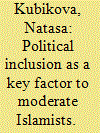

|
|
|
| 10 |
ID:
182591
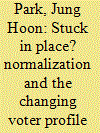

|
|
|
|
|
| Summary/Abstract |
Using the case of the Indonesian Prosperous Justice Party (PKS), I seek to measure the actual impact of Islamist parties’ moderation on their electoral performances and voter bases. Statistical analyses find that although PKS has experienced an influx of diverse voters since the early 2000s, the influx was offset by a gradual withdrawal of educated Islamist voters, who had been loyal to the party since its establishment. I further claim that this change in PKS's voter profile was attributable not to moderation per se but to normalization, manifesting in an adaptation of the party elites’ behaviors to the existing patterns in Indonesian politics. The party's recent policy shift with a conservative tone was insufficient to regain votes from its original supporters, who already saw PKS as a run-of-the-mill party. PKS's case implies that it is necessary for Islamist parties to maintain their distinctiveness as an alternative voice in the party system.
|
|
|
|
|
|
|
|
|
|
|
|
|
|
|
|
| 11 |
ID:
188978
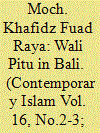

|
|
|
|
|
| Summary/Abstract |
The iconic Bali as a Hindu Island currently has a double image as a “Wali Island” because Wali Pitu tombs were found which differ from those of Wali Songo. Wali Pitu is unique because of its existence at the heart of Hindu civilization in Bali and through a unique process from the cult of Wali Songo. As a new site, Wali Pitu is a new prospect for halal tourism, where several important aspects can invite many pilgrims. Wali Pitu is considered a new halal tourism opportunity to build an image of Muslim holiness amid the hegemony of Hindu society in Indonesia, which serves as the creation of religious moderation in contemporary Indonesia.
|
|
|
|
|
|
|
|
|
|
|
|
|
|
|
|
| 12 |
ID:
146005
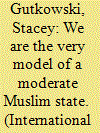

|
|
|
|
|
| Summary/Abstract |
Despite its significance to one of the most problematic discursive binaries of the ‘War on Terror’, moderation has been a largely taken for granted theoretical and empirical category in the discipline of International Relations. To prompt further conversation, this article examines ‘Islamic moderation’ as part of Middle Eastern states’ nation branding in the decade and half since 9/11, using Jordan as a case study. I argue that while Jordan’s official and state-endorsed civil society efforts to promote ‘moderate Islam’ and interfaith dialogue stem in part from authentic interest in promoting dialogue and peace, the Jordanian Hashemite regime has also used the Amman Messages to deepen political trust with the United States, attempting to instrumentalize the moral authority of religion as a form of state productive power. It has done so by playing on a myth of religious moderation which has resonated in both the Middle East and the West since 9/11.
|
|
|
|
|
|
|
|
|
|
|
|
|
|
|
|
| 13 |
ID:
101695
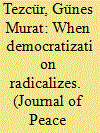

|
|
|
|
|
| Publication |
2010.
|
| Summary/Abstract |
This article addresses a historical puzzle: Why did the insurgent PKK (Partiya Karkerên Kurdistan), which was militarily defeated, which renounced the goal of secession, and whose leader was under the custody of the Turkish state, remobilize its armed forces in a time when opportunities for the peaceful solution of the Kurdish question were unprecedented in Turkey? The PKK's radicalization at a period of EU-induced democratization in Turkey counters the conventional argument that fostering democracy would reduce the problems of ethnic conflict. Explanations based on resource mobilization, political opportunity structures, and cognitive framing fail to provide a satisfactory answer. The article argues that democratization will not necessarily facilitate the end of violent conflict as long as it introduces competition that challenges the political hegemony of the insurgent organization over its ethnic constituency. Under the dynamics of competition, the survival of the organization necessitates radicalization rather than moderation. As long as the insurgent organization successfully recruits new militants, democratization is not a panacea to violent conflict. The findings indicate that research on the micro-level dynamics of insurgency recruitment will contribute to a better understanding of ethnic conflict management. Data come from multiple sources including ethnographic fieldwork, statistical analyses of quantitative data (i.e. spatial clustering and ecological inference), and systematic reading of original documents.
|
|
|
|
|
|
|
|
|
|
|
|
|
|
|
|
| 14 |
ID:
101347


|
|
|
|
|
| Publication |
2010.
|
| Summary/Abstract |
This article examines the extent to which the Malaysian Islamic Party (PAS) and the Prosperous Justice Party (PKS) are becoming more moderate in their strategy and ideology. The author contends that both parties are struggling over the extent to which they should moderate in response both to strategic incentives present in the Malaysian and Indonesian political systems and to the political learning process whereby both parties are coming to understand the preferences of voters in their respective political systems. This process is complicated by divisions in the parties between pragmatists who would postpone controversial goals to reach out to non-devout voters, and purists who prioritize ideological authenticity.
|
|
|
|
|
|
|
|
|
|
|
|
|
|
|
|
| 15 |
ID:
019188
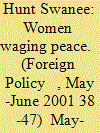

|
|
|
|
|
| Publication |
May-June 2001.
|
| Description |
38-47
|
|
|
|
|
|
|
|
|
|
|
|
|
|
|
|
|
|
|
|
|